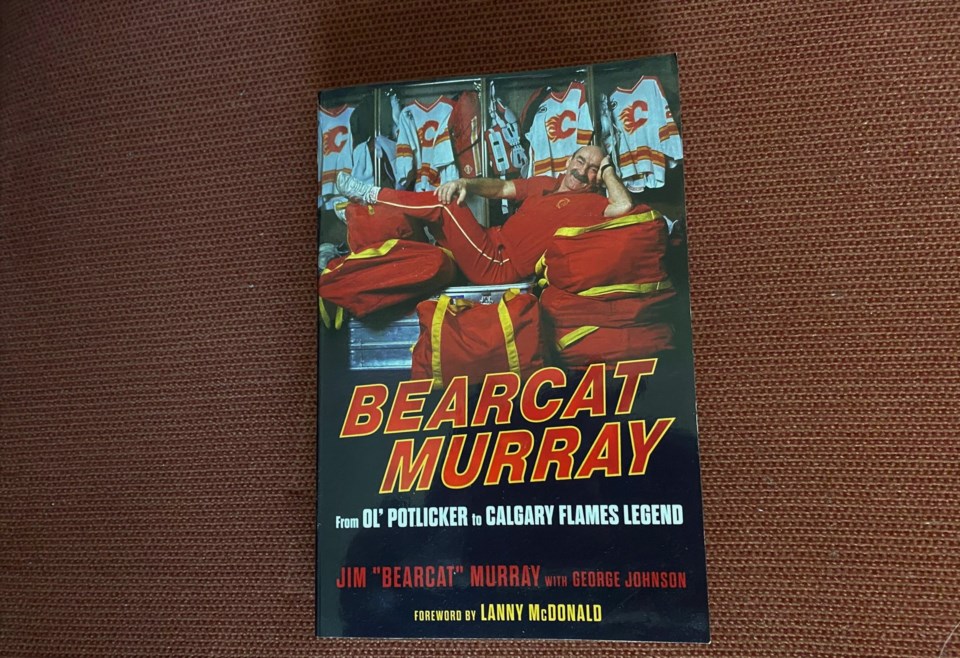YORKTON - When I read a sports book for review I always make an effort to interview the author for a few added insights.
So after finishing Bearcat Murray recently I was looking forward to a chat with the famous former Calgary Flames trainer, only to sadly learn he had died in June.
It would have been really cool for a journalist in Yorkton, Sask. to chat with another hockey hall of famer – there have been a few through the years – but alas that was not possible.
But, what it did do was make the book read rather more significant.
In writing the book Murray provided a book full of stories gleaned from a long life from growing up in Alberta through time as a jockey, working rodeos, working in Estevan to of course years as the familiar trainer of the Calgary Flames. As you might expect such a long and varied life provided Murray with dozens of stories reflecting Prairie life and of course about some of the greats of hockey.
It was always my sense in seeing anything to do with the highly recognizable Murray that he was ‘a good guy,’ and that certainly comes through in his book, which includes input from former players, associates and family, adding an interesting aspect and balance to the story.
Part of Bearcat’s personality was no doubt forged in the difficult times of his youth when money was scarce for most and helping each other was a must.
“Those were lean days for pret’ near everybody,” he related in the book. “We lived about a block and a half from the elevator where my dad worked – there must’ve been six or seven of those elevators in a row. And the train, which ran right by there, would be full of guys riding the boxcars. All of them were from Ontario – doctors, lawyers, business guys, you name it – and they came out west because they could always get work here, on the farms, whether it was harvest or not.
“They’d jump out of the boxcars and my dad would be at the train stop there to meet ‘em and tell ‘em, “See that yellow house down there? Go to the back door and my wife’ll feed you.” Well. I was a little kid and I’d be out there on the back step talking to these guys. Curious, you know. They turned out to be the most interesting people. So friendly. So well-spoken. So intelligent. And here they were riding in boxcars a long way from home, looking for any kind of work.”
While Murray is gone, I was able to briefly chat with George Johnson who self-admittedly only helped “clean-up” some of Murray’s writing, as well as contacting those who provided their memories of Bearcat to the story.
“We spent a lot of time on the road together,” said Johnson.
The book, from Triumph Books, said Johnson actually came rather easily to Murray, in the sense he was always a natural storyteller.
“He just sat down and he was Bearcat,” said Johnson, adding it was that rare ability to tell a good story which so quickly endeared Murray to people he met. “Because he told stories about famous people you left feeling ‘he’s a pal of mine’. . . Anybody who loved hockey, loved Bearcat.”
Having worked closely with Murray, Johnson perhaps appreciates most keenly to be fortunate they were able to complete the book before his death.
While Murray was not ill as the process began Johnson noted, “there was a sense he wanted to get it down.”
Readers should be thankful Murray did complete the book. It is a great collection of stories that tell a lot about the game of hockey, as well about the man himself.
What was perhaps most surprising was what Bearcat looked back on most fondly in terms of a hockey highlight.
“People always ask me to pick one highlight from all my years as a trainer in the NHL, and everyone expects me to say the night we won the Stanley Cup in Montreal. That’s the obvious one, of course. And it was totally amazing, don’t get me wrong,” noted the book.
“But beating the Oiler in the playoffs in ’86, has got to be at the very top of my list. My greatest thrill in hockey. I have pictures of me jumping in the air at the end of Game 7 in Edmonton. Not because they were so good; because beating them was such a great achievement. They were the best and we’d just beaten the best.
“I mean, I went nuts.”
For Johnson learning Murray was satisfied with the book was the best part of the process.
“When he said ‘my old potlicker we did an OK job meant more to me than anything else,” said Johnson.
Not surprisingly Murray was inducted into the Hockey Hall of Fame, a milestone he fully appreciated and deserved.
“Going into the Hockey Hall of Fame in 2009, after being absolutely thrilled out of my mind just to get the Flames job in the first place, by pure luck really, is something I really, honestly can’t put into words,” notes the book.
“And if you ask anyone who knows me even a little bit, they’ll tell you I’m never at a loss for words.
“If you’re lucky enough for something like that to happen to you, it makes you think back to all the things that happened to your career – the people you met, the friends you made, winning the Stanley Cup, the wins and the losses, the highs and the lows.
“All of it. Every bit.”

